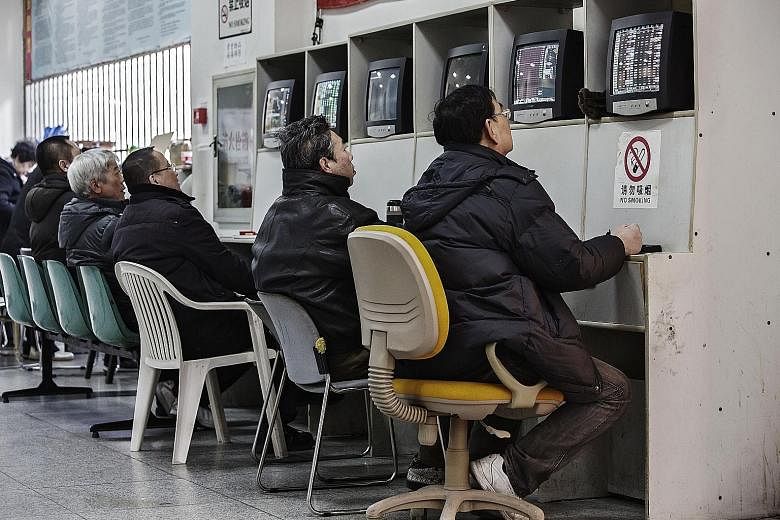BEIJING • This year is seen going down as the worst since 2011 for China's stock investors as the memory of last summer's rout lingers and speculative buying switches to the housing market.
The Shanghai Composite Index will end the year at 3,075, according to the median forecast in a Bloomberg poll of 10 strategists and fund managers. That implies a 13 per cent drop over the 12-month period, the steepest in five years, and a gain of 2.9 per cent from Wednesday's close.
Fading prospects for monetary easing, a slowing economy and the risk of higher US borrowing costs spurring yuan weakness were among factors weighing on the nation's shares, the survey showed.
Turnover on the world's second-largest stock market has collapsed to a two-year low as China's army of investors, unnerved by 2015's plunge in equity values, charged into other assets.
After a frenzied bet on commodities futures soured, they have set their sights on a bigger target - property. With new home prices now jumping the most in six years, analysts are scaling back projections for interest-rate cuts.
"The property market and the stock market are like a seesaw," said Sinolink Securities strategist Li Lifeng in Shanghai. "If the 'fever' in the property market doesn't cool down, funds will flow from equities into real estate."
Small-cap technology stocks are the least preferred by analysts in the survey because of stretched valuations, while building firms are favoured, thanks to government efforts to boost infrastructure investment. "It will still probably take a long time for high-valuation technology companies to go back to normal," said Central China Securities strategist Zhang Gang in Shanghai.
Trading on China's stock exchanges has dwindled as share prices tread water. Five-day average turnover fell to 364 billion yuan (S$74.8 billion), the lowest since November 2014 and down from more than 2 trillion yuan last year, while the Shanghai Composite Index closed on Wednesday at its average level for the past three months. The gauge added 0.4 per cent to 3,244.39 yesterday. That is a sharp contrast with the housing market, which chief economist Ma Jun of the People's Bank of China's (PBOC's) research bureau called a "bubble" in an interview this month.
New home prices in Shanghai jumped a record 4.4 per cent in August for a year-on-year gain of 31 per cent, while Beijing's climbed 24 per cent from a year earlier.
The surge in home prices is complicating the task for policymakers seeking to shore up an economy growing at its slowest pace since 1990 without spurring excessive speculation.
The PBOC has kept benchmark interest rates unchanged since last October, while PBOC Deputy Governor Yi Gang said in a television interview earlier this month that the nation's short-term goal is to slow rising leverage.
At the same time, the prospect of higher US borrowing costs threatens to spur capital outflows as the dollar strengthens against the yuan.
BLOOMBERG

